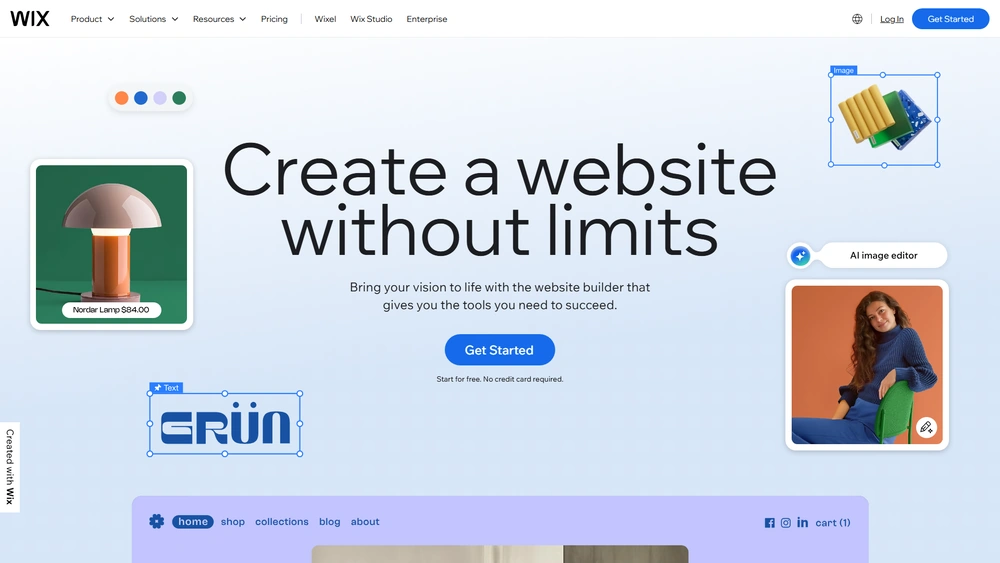Wix eCommerce Overview & 2026 Industry Position
Wix eCommerce is part of the wider Wix platform, offering versatile store-building tools to small and mid-sized merchants. Known for balancing simplicity with extensibility, it continues to attract creators, boutique retailers, and service-based sellers worldwide. As of 2026, Wix eCommerce positions itself at the intersection of design freedom, AI automation, and global selling — especially in an era when SMBs need omnichannel capability without complex code. With over 700,000 active online stores and an expanding plugin ecosystem, Wix eCommerce is doubling down on helping entrepreneurs scale efficiently across web, mobile, and marketplaces, while staying design-forward.
From Launch to 2026: Wix eCommerce’s Journey
Originally launched in 2013 as a shopping cart integration atop the core Wix Website Builder, Wix eCommerce has since evolved into a robust native solution. Major milestones include:
- 2016: App Market expansion introduced key eCommerce plugins to elevate store functionality.
- 2018: Rollout of Wix Code (now Velo) allowed full-stack custom store apps.
- 2020: Curveball pandemic demand accelerated Wix Payments and logistics features.
- 2022: Launched Wix POS and native dropshipping integrations via Modalyst.
- 2023: Integrated AI product descriptions and fulfillment tracking tools.
- 2025: Unveiled FlowOS — a lightweight AI framework optimizing checkout conversion, promo testing, and buyer retention.
The 2025 thesis: Wix eCommerce competes on hybrid agility — offering code-optional customization with streamlined multichannel scaling for nontechnical SMBs.

Wix eCommerce Key Features
Wix eCommerce is built to offer full-cycle selling features within a no-code (but extendable) platform. Core features include:
- AI Store Assistant: Generates optimized product listings with smart tags and SEO in seconds.
- End-to-End Inventory: Track SKU levels, variants, bundles, drop shipping, and supplier sync.
- Custom Checkout: Add custom fields, currency rules, and flexible payments via Wix Payments or Stripe.
- Multichannel Selling: Sync products to Facebook, Instagram Shop, eBay, and Amazon (via plugins).
- POS System: Unified in-person and online inventory with branded receipts and tap-to-pay hardware.
- Mobile App Builder: Convert your store into branded native Android/iOS apps with push notifications.
- Abandoned Cart Tracker: Automated recovery flows with incentives and expiry timers.
Workflow & UX Experience
Wix eCommerce emphasizes intuitive interfaces with drag-and-drop control. The editor uses visual snapping and stacking with live mobile previews. Workflows like launching a product, configuring tax rules, and managing abandoned carts are grouped logically in tabs. Accessible templates, AI content suggestions, and onboarding wizards ease the learning curve — without sacrificing underlying scale or flexibility.
Wix eCommerce Pricing Analysis & Value Metrics
| Plan | Monthly Price (USD) | Main Inclusions |
|---|---|---|
| Business Basic | $27 | Secure checkout, custom domain, unlimited products |
| Business Unlimited | $32 | Advanced shipping, subscriptions, 35GB storage, product reviews |
| Business VIP | $59 | Priority support, loyalty programs, 50GB storage, multiple currencies |
Value Verdict: For merchants creating branded stores without engineers or plugins, Wix eCommerce pricing remains value-aligned, especially with its built-in POS and global tax handling.
Competitive Landscape
| Platform | Best For | Key Distinction |
|---|---|---|
| Wix eCommerce | SMBs seeking design freedom | No-code, POS, AI content, strong globalization |
| Shopify | D2C and B2C brands at scale | App ecosystem, high scalability, developer-centric |
| Squarespace Commerce | Creative professionals | Strong visuals, simpler store logic |
| BigCommerce | Catalog-heavy B2B/B2C hybrids | Robust APIs, headless commerce |
Common Use Cases & Verticals
- Apparel or accessories brands scaling from Etsy
- Service-based businesses bundling physical + digital
- Cafés or food sellers managing POS with delivery
- Local/home businesses launching native apps
- Offline retailers adding online inventory presence
Third-Party Integrations & Ecosystem
Wix eCommerce includes hundreds of App Market integrations, ranging from payments to fulfillment and analytics:
- Payment Solutions: PayPal, Wix Payments, Stripe, Klarna, Afterpay
- CRM/Email: HubSpot, Brevo, Mailchimp, Wix Ascend
- Shipping: Shippo, EasyShip, USPS/UPS/FedEx native tie-ins
- Accounting: QuickBooks, Xero exports
Wix eCommerce Pros & Cons
- ✔ Design flexibility powered by drag-and-drop + Velo custom code.
- ✔ AI-supported workflows save hours (listing creation, recovery emails).
- ✔ Price-to-feature ratio stays competitive for SMBs under $500K revenue.
- ✘ SEO and mobile optimization require manual tweaking often.
- ✘ Heavy reliance on Wix-native payment tools limits advanced options.
- ✘ Not ideal for huge catalogs (+10,000 SKUs).
Final Thoughts & Audience Fit
For side-hustlers, creative pros, service-led shops, and growing direct-makers, Wix eCommerce offers a worry-free way to build and monetize a well-designed storefront. Its AI-backed enhancements, app ecosystem, and hybrid selling model now rival competitors — without the technical headaches of traditional platforms. Power users may find limitations without external tools, but for fast-launching, brand-controlled stores, Wix eCommerce remains a smart 2025 pick.
Pro Tip: Maximize Wix eCommerce value by pairing the Business Unlimited tier with Google Shopping sync and the Mobile App Builder — you’ll reach 2x the audience with minimal friction.
Wix eCommerce FAQ
Yes, Wix eCommerce integrates directly with Modalyst and Printful, making dropshipping fully automated and beginner-friendly by default.
Yes. Starting with the Unlimited plan, you can enable store translation and display prices in over 30 currencies. It supports geolocation for accurate display.
Real-time shipping rates, label printing, and tracking APIs are provided through native and partner integrations like Shippo, Easypost, and USPS.
Yes. You can import products, customer records, and orders using CSV, third-party tools, or the Cart2Cart app inside the Wix App Market.
Absolutely. All themes are mobile-responsive, and the Mobile App Builder allows store owners to launch their own branded apps independently.


